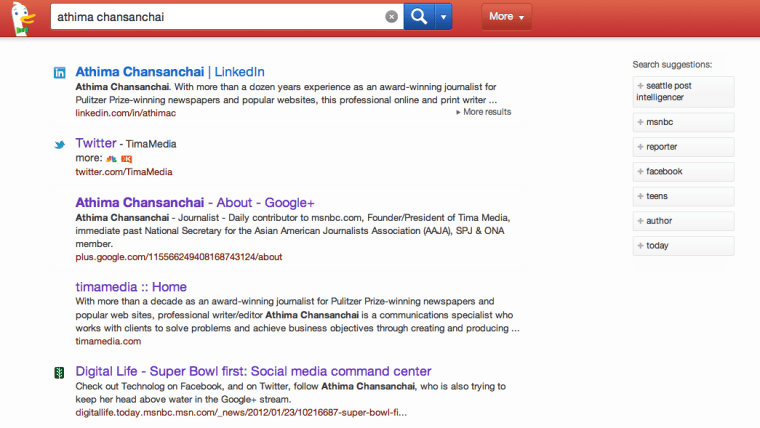Search engine users concerned about being tracked and their data being used to link them to ads that follow them around as they surf on the Internet are tuning in to an alternative to Google, Bing and Yahoo: the playfully named DuckDuckGo.
(Msnbc.com is a joint venture of Microsoft and NBC Universal.)
Over the course of a year, the search engine has spiked in search queries, up 227 percent to almost 1.5 million daily. In March, more than 41 million queries have gone through DuckDuckGo, from a modest beginning in April 2010 with about 1.1 million searches that month, with only about 40,000 daily. (While impressive, don't think that it's more than a drop next to the Google ocean. Searches on the most common verb for searching the Internet top a billion a day.)
But one thing that separates DuckDuckGo from the rest of the pack is that it has become the darling of the loosely organized hacktivist group Anonymous, which gave it its blessing through an email to The Next Web. (Supposedly, Anonymous also launched its own Ubuntu-based OS recently, though members also seemed to just as quickly claim it was fake.)
One of the reasons it may be so popular is its privacy policy, which "does not store any personal information, e.g. IP addresses or user agents: see our privacy policy for details. We also have an encrypted (SSL) version, two non-JS versions (HTML & lite), aTor hidden service (about), several privacy settings (including POST & RefControl), and we allow you to use URL parameters instead of cookies to store settings."

If you haven't resigned yourself to be tracked and profiled, and accept that your information is out there and you can't do anything about it, then you probably won't care about what DuckDuckGo has to offer. But it is a clean interface, with no ads in its search results pages, and tons of shortcuts such as calculations and conversions on its Goodies page.
For those who need a more visual tutorial, DuckDuckGo created a funny infographic. And this one, too, will probably get the point across. In an eggshell, it's this: every time you use Google, your search is tracked by the sites you found and used by third-party advertisers to create profile of you and place ads that seem to follow you everywhere you go online. (But remember, you can turn off Web History in Google, we've told you how to do it.)
Check out Technolog on Facebook, and on Twitter, follow Athima Chansanchai, who is also trying to keep her head above water in the Google+ stream.
